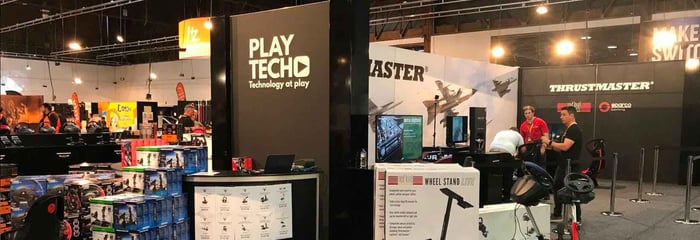
It's All Fun & Games
How Playtech used Cin7 in its pivot from wholesaling technology to connecting directly with customers and thriving in an industry famous for paper-thin margins.
Paul Kao describes Playtech as a typical family-run New Zealand small business. His parents launched the company under another form in 1993, a PC and component distributor and wholesaler.
Over the years, however, technology got cheaper and cheaper, and PCs became commodities. By the time Paul was ready to take over the business, he knew things needed to change.
“The distribution wholesale market started getting squeezed,” Paul says. “We really wanted to become a direct-to-consumer business, using our knowledge and our existing relationships with vendors to bring technology to New Zealand more cost-effectively and to make it more fun for the customers.”
By 2007, Paul had successfully pivoted Playtech to become a multichannel company with a heavy emphasis on custom PC builds, an experiential boutique store, and a robust ecommerce channel that could handle the bulk of their transactions.
A Neighborhood Store With National Reach
The transition from pure wholesale didn’t happen overnight.
“We wanted our business to run as much online as we could make it,” Paul says. “We also wanted our store to be a boutique, where walk-ins and loyal customers could both come and have a great customer experience.”
Through its “pedigree and word-of-mouth” growth, Playtech gained a reputation for being a “cool neighborhood store that knows how to build PCs,” Paul says. They started to sell everything from gadgets, keyboards, tablets to kitted-out PCs for their “bread-and-butter” market: PC gamers.
Today, Playtech does the majority of its business online, selling to both individuals and some retailers everywhere in New Zealand through its Magento-based online store.
Old Inventory Management Couldn't Cut It
Paul soon discovered that Playtech’s inventory management software, Exchequer Enterprise, was severely inadequate to the new business model.
The company manages thousands of products in its warehouse. It had to track those products from supplier to customer (and sometimes back again for returns). Finally, Playtech had to create price quotes for custom PC builds based on variable components.
Exchequer made this very difficult. First, it was geared to wholesale and bulk distribution, not retail. More critically, it required Playtech to create a code number for every product in its inventory and to use those codes for everything from stock intake to product searches, instead of using product serial numbers.
“It was just a beast to run reports, to understand where a product came from and who we sold it to how it came back into the system if there was a return,” Paul says. “It just wasn’t fit for the model and it had some major issues that caused it to crash badly a lot.”
Going with Cin7 Inventory Control
Playtech was Cin7’s first client and a key collaborator in the development of its core modules. Playtech had worked with Danny Ing’s web development business before, so when Danny launched Cin7, Paul seized the opportunity to switch solutions.
“The biggest kicker for us was Cin7’s support for serial number tracking of every item and it was a God-send,” Paul says. “We can pick up an item, scan the serial number, and know everything we need to know about that product: where it came from, how much it cost, if it was sold or returned. The serial number holds that whole paper trail.”
Benefits of Cin7 for Inventory Management
Playtech today uses Cin7’s inventory management software to pick orders in the warehouse, price and kit-out custom PCs, process sales in its store and through its integrated Magento ecommerce website, and sell at tech and gaming expos all with a dramatically reduced amount of administration and data entry.
For example, prior to Cin7, a stocktake required Playtech to shut down its warehouse for a day as staff members walked through the shelves with reams of paper printouts. Using Cin7’s Pick’n’Pack module, the process is much easier, quicker and leads to no operational downtime.
“We don’t have to print out a whole stack of papers now and say go and find this item on the shelf and hopefully it’s there,” Paul says. “Now we just go through the shelf, scan every item, and the system tells us if we have extra of one thing or if we’re missing something else. Now we just do a stocktake on-the-fly.”
Cin7’s level of inventory control is crucial to keep costs down in an industry in which a business makes $20 on a $1,000 item. Cin7 helped Playtech reduce costs, lower inventory shrinkage, and increase the bottom line.
“The key thing is that we are now very clear about where our inventory items sit,” Paul says. “It’s much easier to utilize than any other inventory system that we’ve seen. And because it’s in the cloud, we’re no longer tied to an umbilical cord to a software server. We can do our business on the road and still have full visibility no matter where we are.”



